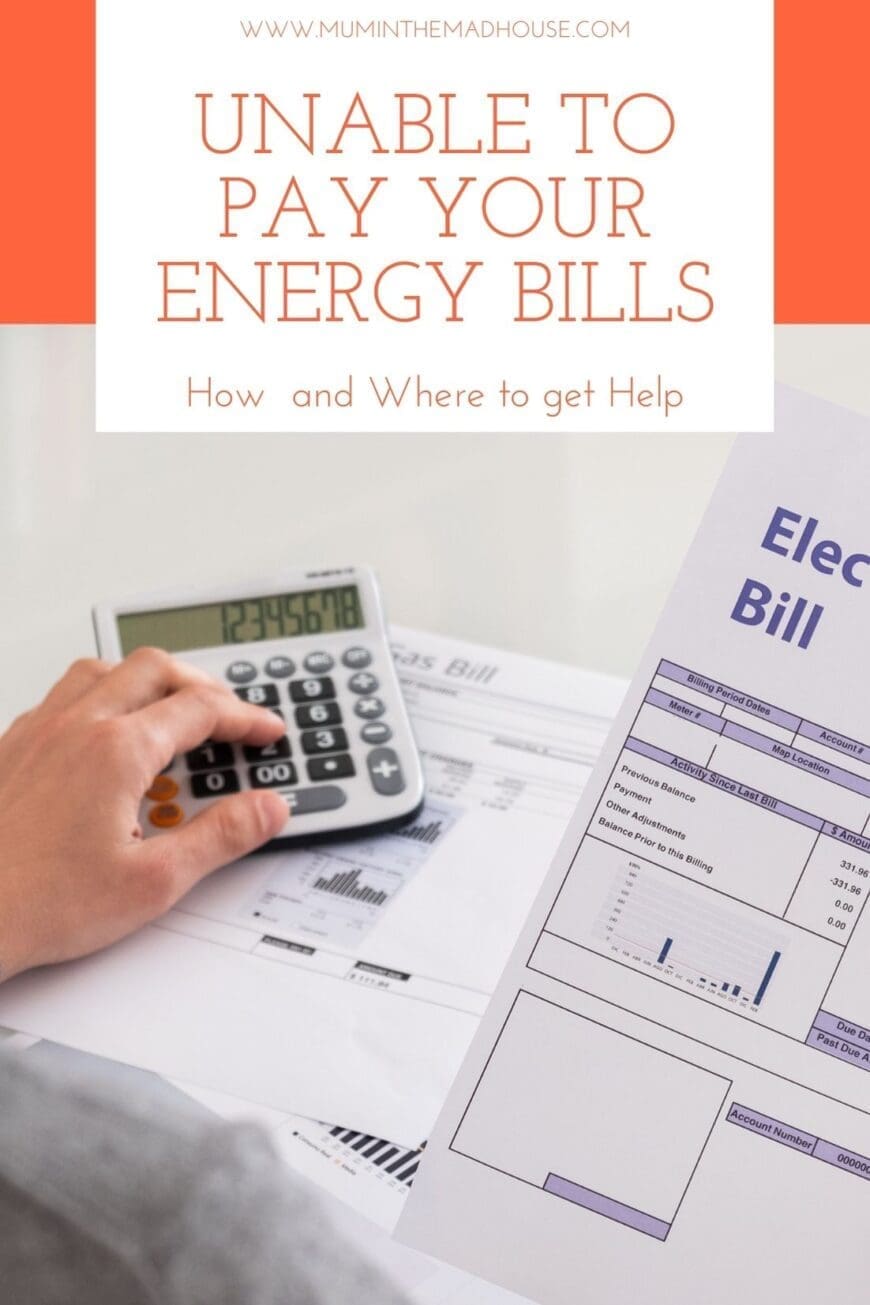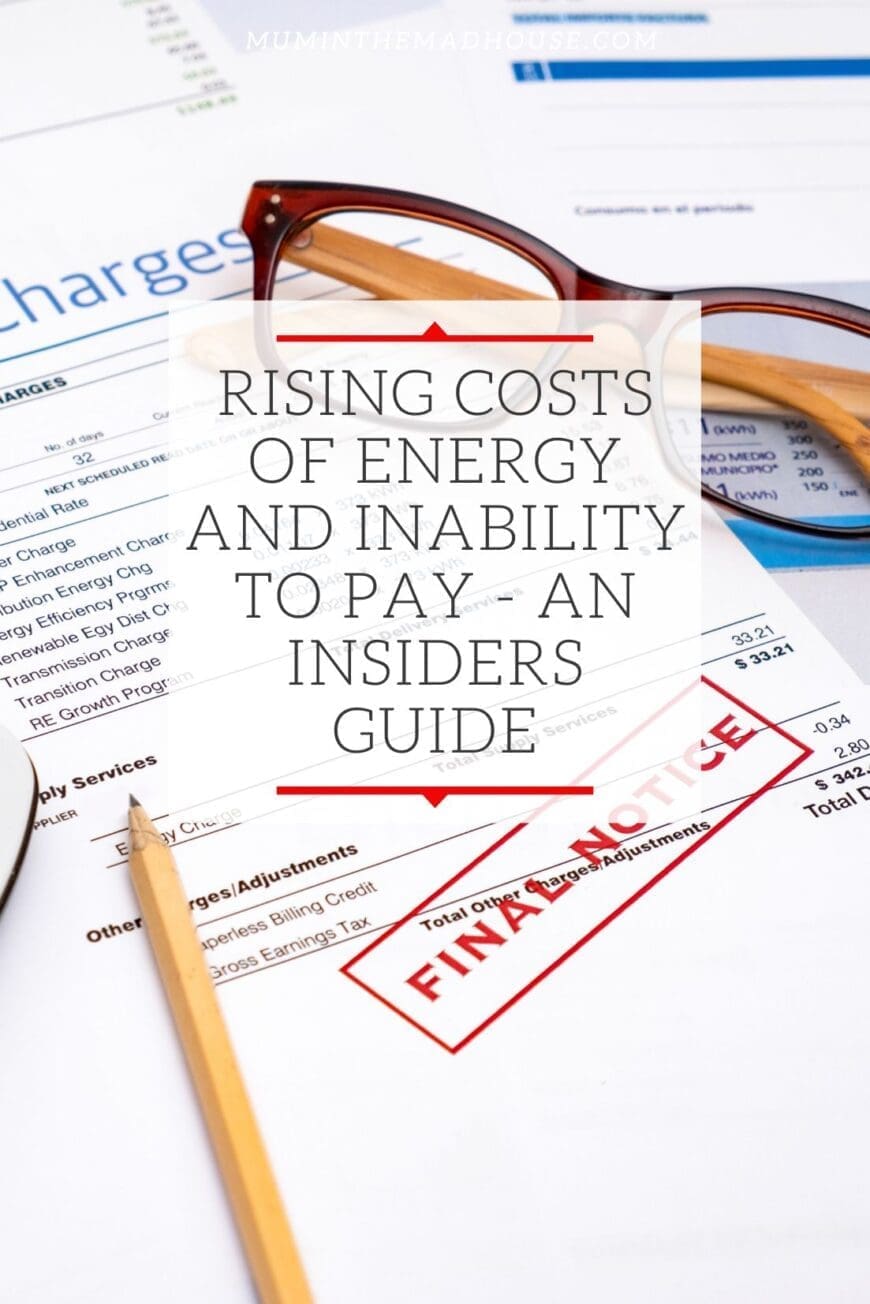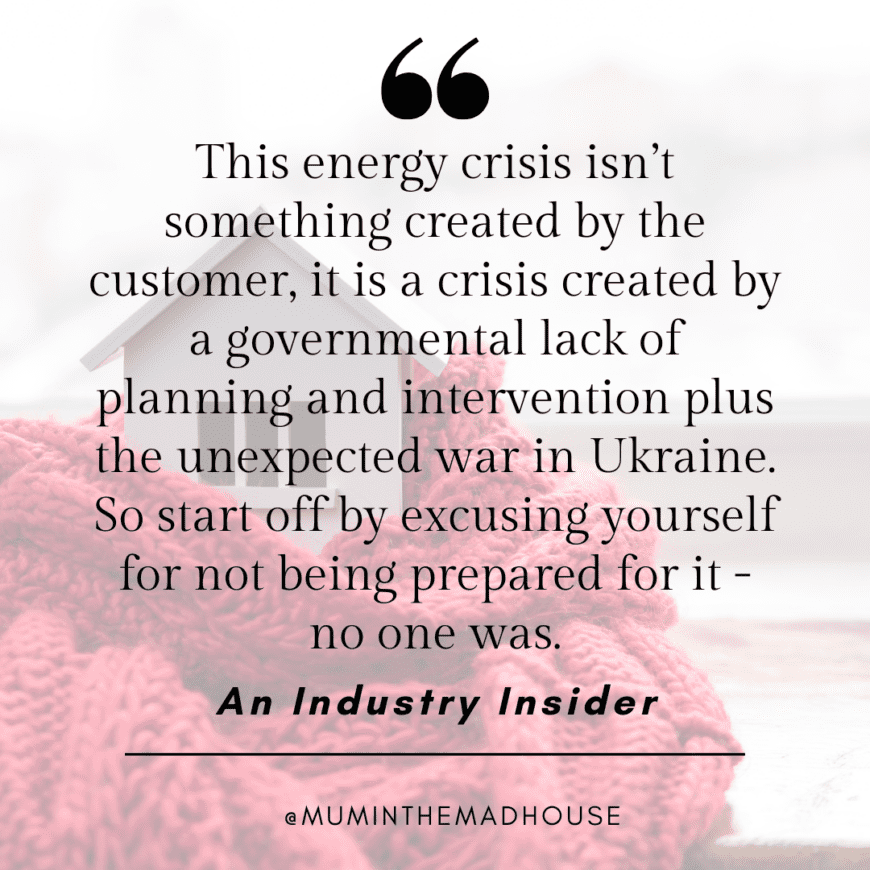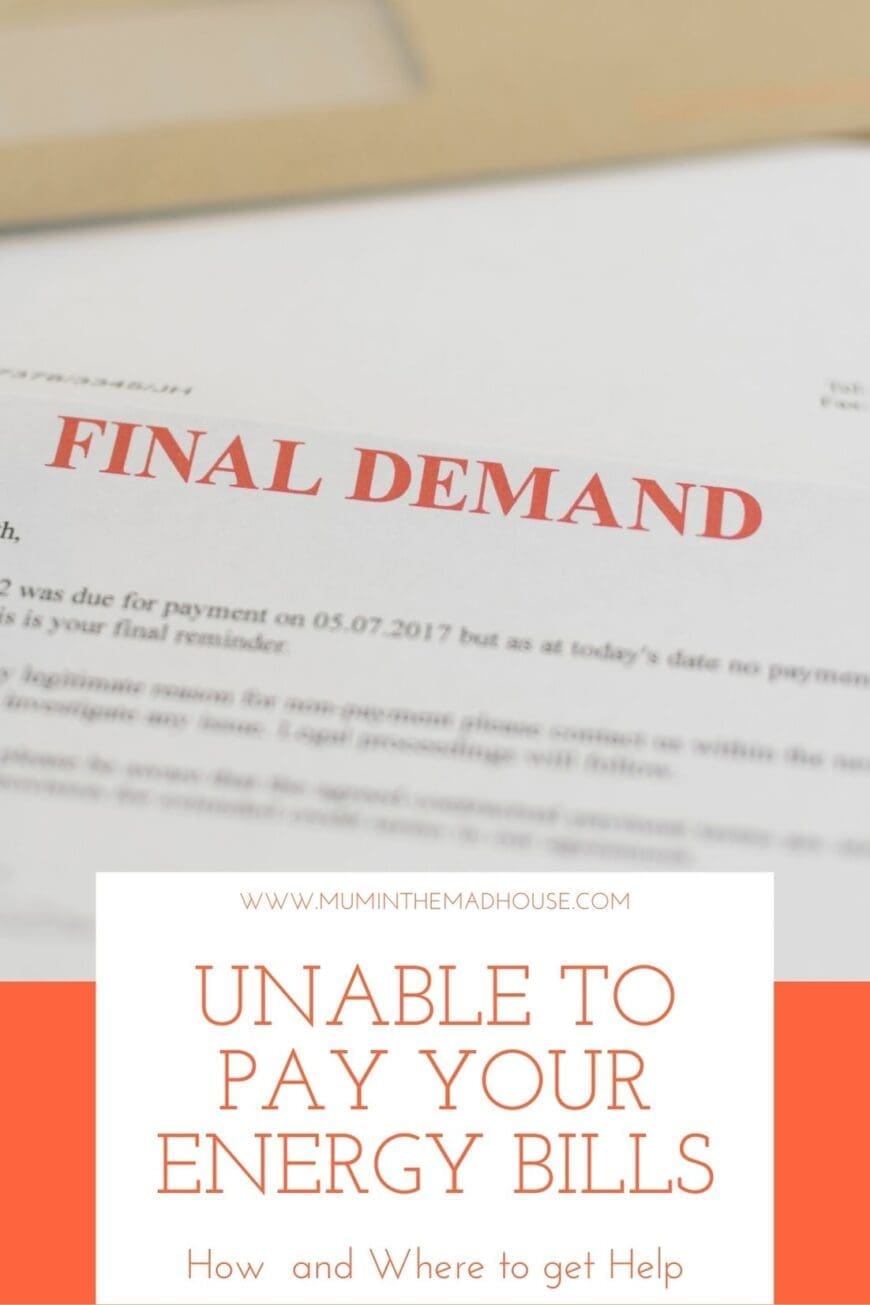I think that the majority of the UK is deeply concerned and anxious about the rising energy costs and other expenses and how we are all going to cope in the coming months and pay our energy bills. There will be lots of people unable to pay their upcoming utility bills and I know that I am very anxious about it (especially having just received my water bill and the direct debits more than doubling). I have blog posts about ways to save energy, however, this crisis is not something you can budget your way out of. I know you can not budget your way out of destitution and would never minimise this by suggesting you can.

One of my online friends works in the energy industry and I asked her for her opinion on things and how people can take action – So over to them
I’ve worked in the energy industry – in the retail sector (the people you pay you bill to) and in the wider strategy and planning of the energy industry for over 20 years, I saw price rises coming last year but even I couldn’t imagine a capped price level higher than £2000 ( The price cap is the maximum amount suppliers can charge customers in England, Scotland and Wales for each unit of energy used). With all my knowledge, experience and exposure to the detail if I couldn’t see it – there was nothing you could have done to protect yourself from the energy rises. This crisis isn’t something created by the customer, it is a crisis created by a governmental lack of planning and intervention and the unexpected war in Ukraine. So start off by excusing yourself for not being prepared for it- no one was.
Having sky-high energy bills is not your fault, you couldn’t have avoided it.
The real solutions to this are long term and need massive government intervention, including an overhaul of markets and systems; and time to build some new infrastructure (let’s leave aside the question of nationalisation, these other problems need to be solved whether we have a nationalised industry or one operated by companies). The long-term solutions matter and I think we should all be asking our elected politicians what they are going to do- locally and nationally. But these solutions will not get us through the winter and the potentially even harder 2023.
The first thing you can do is the thing we’ve all thought of- cut your energy usage where you can- and there are lots of resources out there to help with that. But let’s be honest, we live in a country where it gets cold in the winter, it gets dark early and we need to eat warm meals, we need to use energy.

What to do if you can’t afford to pay for the energy you use?
Firstly, across the board the energy companies are committed to supporting their customers through this period, in fact, they have to, they know very acutely that their customers are going to struggle to pay. The people who answer your calls when you phone your energy company are in the same position as you. It may not always seem like it but it is in no one’s interest to cut you off or to harass you for energy debt. So what should you do?
Most companies will be offering a fixed or flexible price tariff that is higher than the current cap in addition to the cap price. I would avoid signing up for these, although you will be locking in a price for a longer time (although likely only 12 months) it is likely you will end up paying more overall as these products have no limit on how much profit the company can earn (compared to the price cap where the maximum a company can earn is 1.96%). Although the energy price cap is expected to keep going up and not feel like much of a “cap” it is likely to be the best option for the next 12-18 months.
If you already pay by Direct Debit (most of us do) then your prices are the lowest they can be. You may be tempted to cancel your Direct Debit payment to keep control of what you pay but if you do that you will default to a higher price- for the average customer this will add around £215 to your bill for the year.
If your payment is more than you can afford and you are in financial hardship then you need to speak to your supplier and explain what you can afford to pay and they should work with you on this (Suppliers must work with you to agree on a payment plan you can afford under Ofgem rules. – if they won’t, tell them you want to complain. Suppliers are managed by their complaints and their resolution time so it is in their interest to find an agreement that works. (If you don’t pay Direct Debit it is worth considering as this saving is significant).

You can find your supplier’s number on your bill or on their website. Make a note of who you speak to when you called and any outcome. Alternatively, you can write to them – the citizens advice has a letter template to use.
While you continue to make payments your supplier is extremely unlikely to take any debt follow-up action, which in some cases could include disconnection (If you’ve reached State Pension age, your supplier can’t disconnect you between 1 October and 31 March if you either live alone, or live only with other people who have reached State Pension age, or are children under 18). The key is to keep communicating, you are not alone in being in this situation as thousands of people have already started having these conversations with their suppliers even before the October price rise. Suppliers have a duty of care and have to be reasonable. If you don’t agree a payment plan with your supplier, they might try to force you to have a pre-payment meter installed.

No matter how you pay there is additional support that may be available through your supplier so please ask if there is any support they can give you. This can range from support from an external charity that provides financial advice and debt counselling support to financial contributions to your energy usage. If you are elderly, receive benefits, or have a disabled member of your household you may be able to receive additional help which your supplier will arrange for you.
Finally, it may look from the outside that the companies are sitting back and making record profits (and some are making disgusting levels of profit, that is for another debate) but for the most part suppliers are operating on wafer-thin margins and are lobbying hard within government to get direct customer support on a daily basis and progress is being made. They know how hard this feels for everyone and no one is looking to make it harder for the customer, after all that costs money that they can’t make back from increasing prices. But I know from personal experience that knowing you have a growing debt hanging over you is hard to ignore so keep talking to your supplier, keep talking to those around you to remind you that you are not alone in this crisis.
And in case it’s not clear, I’d always advise against voting Tory.

Helpful Information
Government Help with Bills – Find out if you are eligible on the government’s Help for Households website. This includes help for low-income families and pensions or others on benefits such as energy bill discounts, the winter fuel payment, cost of living payment details, Disability Cost of Living Payments, Pensioner Cost of Living Payment, the cold weather payment and Warm Home Discount.
Citizens Advice Debt Advice – Get in touch with a debt adviser
You can contact Stepchange for free advice if you are having trouble paying your energy bills. Their online debt advice service is available 24 hours a day 7 days a week.
The following energy suppliers offer grants to their customers:
- British Gas Energy Support Fund – apply for a grant on the British Gas Energy Trust website
- Scottish Power Hardship Fund – apply for a grant on the Scottish Power Hardship Fund website
- Ovo Energy Fund – apply for a grant on the Ovo Energy Fund website
- Bulb Energy Fund – apply for a grant on the Bulb Energy Fund website
- E.ON Energy Fund – apply for a grant on the E.ON Energy Fund website
- E.ON Next Energy Fund – apply for a grant on the E.ON Next Energy Fund website
- Octopus ‘Octo Assist Fund’ – apply for a grant on the Octopus website
- EDF Energy Customer Support Fund – sign up to the priority services register to apply for a grant on the EDF Energy website
- British Gas Energy Trust (not just for British Gas Customers) – Apply for a grant on the British Gas Energy Trust website
Check if you can get a local energy grant on the Simple Energy Advice website.
Charis offers a range of schemes to help those with utility debt, both individuals and small businesses including hardship funds and temporary assistance.
If you are a pensioner, disabled or have a medical condition (or someone in your household is) then your energy network might consider you vulnerable and you might be able to get extra help and support from your energy supplier by signing up to the Priority Services Register.
Turn2us has a grants search tool to help you find out what support you might get and also have information on benefits and information on help with paying energy and water bills.
You may also be able to repay your debt directly from your benefits through the Fuel Direct Scheme.
If you need mental health advice right now
You can also get help now on the Mind website.
You can find a local NHS urgent mental health helpline on the NHS website.
You can also call the Samaritans at any time on 116 123

Pingback: How to Save Money on Heating Costs this winter - Mum In The Madhouse